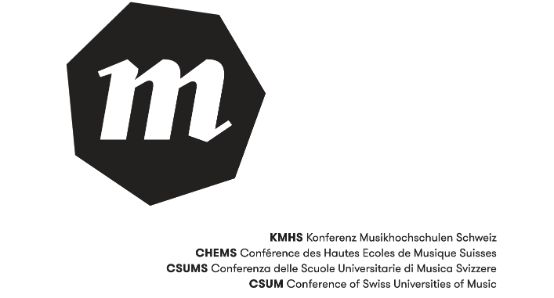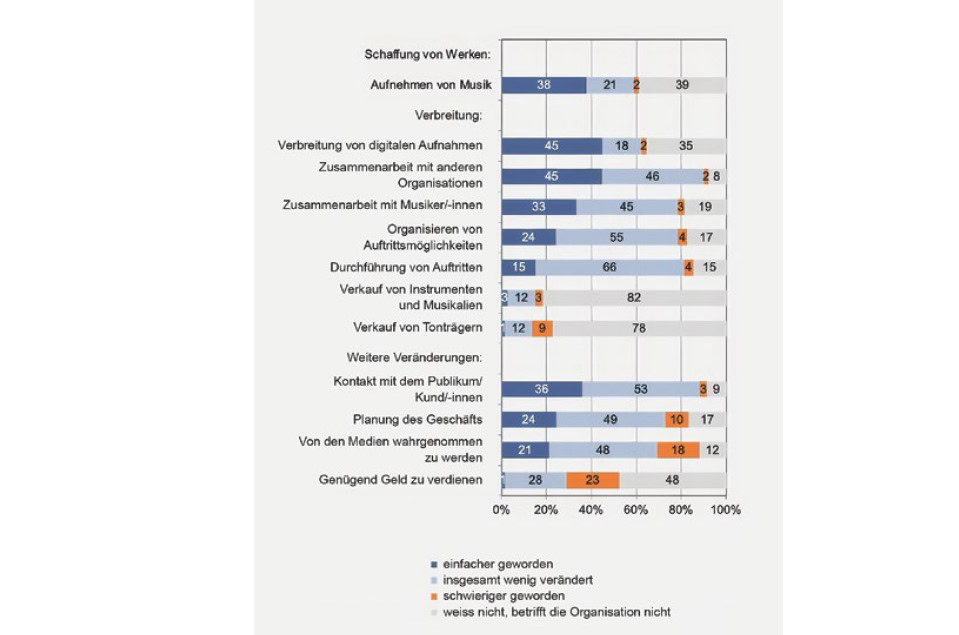New director in Lucerne
Valentin Gloor has been the new Director of the Department of Music at Lucerne University of Applied Sciences and Arts since September 1, 2019. In the following interview, he provides insights into his view of the Swiss music scene.

MvO - Valentin Gloor is very familiar with the Swiss music academy landscape. Before working at the Winterthur Conservatory, he was the founding rector of the Department of Music and later a member of the Board of the Kalaidos University of Applied Sciences Switzerland.
Valentin Gloor, how do you see the current Swiss conservatoire scene?
Highly professional institutions are at work here! Over the last twenty years, they have managed to constantly develop the image of music education, the content and the profiles in the great transition to universities of applied sciences. And the professional field itself is also undergoing change - these aspects have also been integrated into the degree courses, and the "market" is being shaped by the courses. The fourfold performance mandate of training, continuing education, research and services has certainly contributed to the wide range of perspectives we see today. And it is also a field with strong international relationships. I perceive this "scene" as lively, diverse and eager to learn.
Where are the biggest challenges in this market?
This "market" has always been very demanding when it comes to establishing oneself professionally. In addition to artistic or pedagogical skills, graduates are required to make an enormous effort in terms of their own profiling and positioning. And social developments in terms of demographics, migration, educational demands, digitalization - please excuse these buzzwords! - will certainly change the professional reality of musicians in the next twenty years, both artistically and pedagogically. How can conservatoires anticipate such developments and integrate them into the training programs of the future?
You have a very diverse CV, ranging from practical music-making to research activities and management tasks. How will you combine these interests in the future?
I actually always come across a variety of activities and areas of interest when I talk to people who fulfill leadership roles in music education. Diversity seems to be a normal prerequisite. It also reflects the professional reality of musicians: artistic creation, teaching music in many facets, organization, conception, project management... the whole range is lived by most musicians. The management function of a conservatoire encompasses all these strands. Sometimes, however, they are "transposed": Artistic activity perhaps translates into aspects of creativity, presence and performance...it would be exciting to think about this in more depth. In any case, this task actually bundles my interests per se.
Is there still time for your own creative work?
As a transposed activity in the previously mentioned sense: Yes, guaranteed! Understood in the conventional sense: I hope so and am working on it.
What importance do you attach to research activities at Swiss music academies?
A central one! Research is essential for understanding what we do, who we are, where we are and where we are heading. How do we manage to integrate research as a field, but also the "research mindset" into our education and training? This is a big question for me.
As Director of the Lucerne School of Music, you are now also a member of the KMHS (Konferenz Musikhochschulen Schweiz). What do you see as the opportunities and possibilities of this body?
The KMHS bundles the interests of institutions that cooperate and compete with each other at the same time. This is highly demanding! However, if the balancing act in terms of sector policy is successful, the KMHS has great potential to contribute to improving the framework conditions in music education and training, but also in the music profession. I believe that it would ideally do this together with strong partners.
The KMHS also recently commented on the Federal Council's cultural message (see September issue of the Schweizer Musikzeitung). What is your personal position on this message?
This cultural message is close to my heart - I hope it is close to the heart of all of us! Because it is about promoting young talent and cultural participation. The new cultural message is an important further step on the way to full implementation of Article 67a of the Federal Constitution. A long way to go. But we must not forget that over 70% of the Swiss electorate voted in favor of the constitutional article on music education. Over 70%! This is an expression of a powerful mandate to politicians. A first step has been taken in the 2016-19 Dispatch, particularly with regard to broad-based promotion. That is good. And this new cultural message has the potential to take Switzerland a big step forward in the area of promoting musical talent and to further strengthen the important partnership between educational institutions such as music schools and conservatoires. But in the area of general access to music education for all children and young people and in the area of music education in schools, there is still a lot of work to be done to improve the framework conditions. And the Cultural Message 21-24 is not yet a done deal. We have to keep at it!
Politics and political influence in the field of music academies should not be underestimated. How do you perceive this situation in Switzerland?
If politics is the social negotiation of relevant topics and positions, I can live with that. We are convinced that what we do at conservatoires is important to society. And if it really is socially important, social demands are formulated - to a large extent via politics.
Lucerne has a diverse cultural life - where would you like to position your music academy in the future?
The Lucerne School of Music is already positioned in this cultural life and is an important part of it. Of course, it is my task and my goal to maintain and expand the existing partnerships and to enter into new ones. But it is important to see the outstanding work that has already been done here. I see this positioning in cultural life as very convincing.
The work is on schedule, thanks to the enormous commitment of my predecessor Michael Kaufmann and the dedication of the many people involved in working groups, project management and execution. The opening will take place in summer 2020. And a completely new situation awaits us as a university of music. We are moving together, we are moving closer together. It is a logical step in a long process - several institutions with a long history, tradition and their own culture have come together in our conservatory. Now we are coming together to form a new culture. We will all meet each other much more. This will inspire us to new ideas, new projects, new perspectives. We will continue to move forward. That would be my wish. A vibrant music venue will emerge - we are embedded in a great campus at the Südpol in Kriens: the Lucerne Symphony Orchestra, the Südpol event venue with its independent scene, Lucerne Theater, the School of Music - and the School of Music. All together. We will therefore embark on a more intensive, inspiring collaboration internally - but also with partners.
The Lucerne School of Music offers musical and artistic education and training in the heart of the lively cultural environment of Lucerne, the city of music. Students benefit from a flexible training system that allows for individual objectives and a wide range of subject combinations. Concert and stage practice are important components of the course right from the start: The university's numerous ensembles and regular cooperation with the Lucerne Theater, the Lucerne Symphony Orchestra, the Lucerne Festival Academy, the Willisau and Schaffhausen jazz festivals and the Lucerne Jazzkantine provide a practical and varied environment.
The wide range of Bachelor's and Master's degree programs includes classical music, jazz, church and folk music, conducting, wind music direction, composition, theory, music education and music & movement. This is supplemented by the PreCollege. In addition, the Lucerne School of Music offers numerous CAS, DAS and MAS programs as well as individual courses, workshops and academies for further qualification.
In the two competence centers CC Music Performance Research and CC Research Music Education, the Department of Music researches aspects of music production and reception as well as music education and the consumption of music.
The Lucerne School of Music will move into the new building in the south of Lucerne in the 2020/21 academic year. This will bring together all institutes, a public library, research, teaching and event rooms under one roof. Among other things, the new building has its own chamber music hall, a jazz club and a multifunctional black box. Thanks to the mixed use, an open, lively working and meeting place is created for students, staff, partners and a music-interested public.








